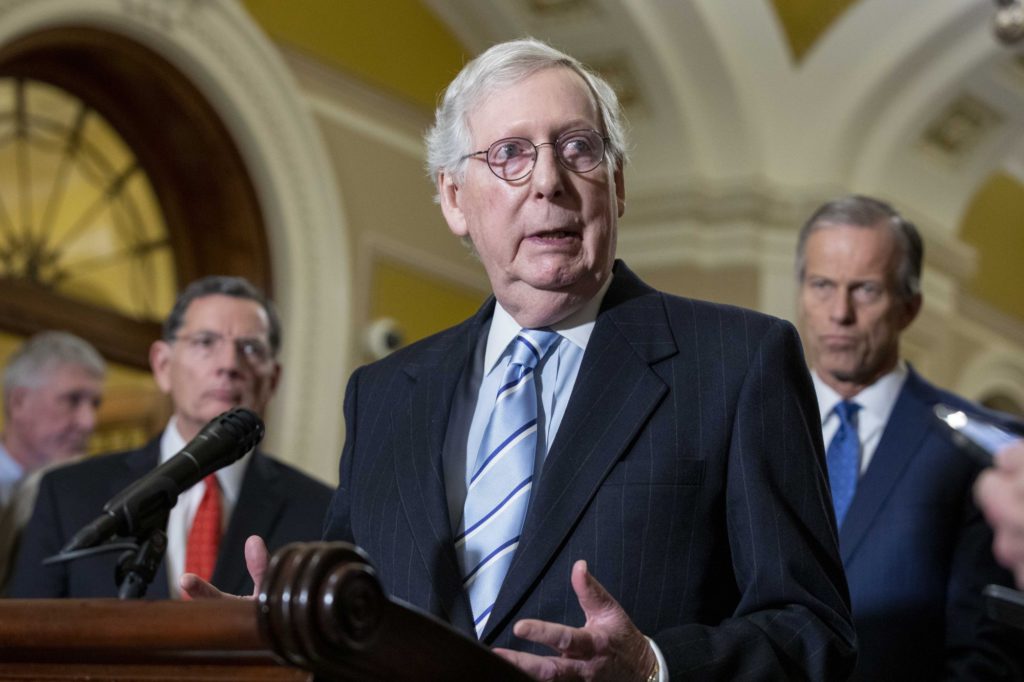Senate GOP leader Mitch McConnell, bruised by his party’s poor performance in the midterm elections, nonetheless emerged a winner in year-end negotiations on the $1.7 trillion government spending bill, collecting significant policy wins and banking leverage for next year’s battle over raising the nation’s debt limit.
(Bloomberg) — Senate GOP leader Mitch McConnell, bruised by his party’s poor performance in the midterm elections, nonetheless emerged a winner in year-end negotiations on the $1.7 trillion government spending bill, collecting significant policy wins and banking leverage for next year’s battle over raising the nation’s debt limit.
But in a preview of the intra-party squabbling that will contribute to congressional gridlock next year, McConnell’s willingness to strike a year-end deal with Democrats sparked a backlash — and a threat of retaliation — from House GOP leader Kevin McCarthy and hard-core conservatives in his own party.
The Kentucky Republican engineered the bipartisan spending legislation to bolster his priorities, particularly higher defense spending, while deflecting some of the more expensive items Democrats wanted on domestic programs. Perhaps even more importantly, he refused to address the federal debt limit and pushed those talks to next year, when his party will control the US House.
A faction of Republicans, including McCarthy, want to use the federal debt limit to extract spending cuts from President Joe Biden in a potential repeat of the 2011 fight that rattled markets and forced then-President Barack Obama to agree to more than $2 trillion in spending cuts over a decade.
The spending legislation, though, has laid bare a Republican schism. The House GOP and a group of Senate Republicans wanted the full-year spending plan delayed until after they take control of the House on Jan. 3. McCarthy, who is trying to shore up support for his bid to become House speaker, backed a threat from a small group of conservatives vowing to block any initiatives next year from Republican senators who vote for the spending legislation, including McConnell.
“When I’m Speaker, their bills will be dead on arrival in the House if this nearly $2T monstrosity is allowed to move forward over our objections and the will of the American people,” McCarthy tweeted.
The California Republican’s hopes for the speakership hinge on hard-liners within his own party, who also happen to be some of McConnell’s loudest detractors.
Asked about whether the threat affected whether he supports McCarthy’s bid to become speaker, McConnell told reporters Tuesday, “I’m pulling for Kevin, I hope he makes it.”
McConnell asserts that the spending package delivers “essentially all” of the GOP’s priorities — including funding for Ukraine, which he called the top priority of most Republicans. It also will give House Republicans months to organize their committees and agenda before climactic fights over spending and debt next summer and fall.
Tension has been growing between McConnell’s establishment wing and a more restless group unhappy with growing federal spending and debt, and livid at a process that led to a 4,155-page bill being filed after midnight less than a week before Christmas.
“I don’t understand how that’s a big win for Republicans, especially right after we’ve just had an election and control of the House has shifted from Democrats to Republicans,” said Senator Mike Lee of Utah, one of a handful of Senate Republicans blasting the bill and the process at a press conference featuring a printout of the massive legislation. Lee said he had talked repeatedly with McCarthy about efforts to stop the package.
“We ought to be supporting the Republicans in the House who have said they do not want this bill,” added Florida Senator Rick Scott.
McConnell decided Republicans could get a better deal now than kick the can into next year, and said the defense money was needed now to counter China and Russia’s invasion of Ukraine. But to get his support, McConnell insisted the package comply with terms he set: Defense outlays sought by Republicans well above Biden’s budget, without paying a commensurate ransom.
Last-ditch Democratic efforts to pass a series of items failed to clear McConnell’s bar, including assorted immigration provisions, a marijuana banking bill, legislation equalizing penalties for crack and powder cocaine, and a revival of Biden’s child tax credit.
One key item where McConnell and Democrats aligned was a rewrite of the Electoral Count Act, to make it harder to challenge a state’s electoral votes in a de facto rebuke of former President Donald Trump’s efforts to overturn those results ahead of and during the Jan. 6th insurrection at the US Capitol. It’s the kind of legislation that also had little chance in a Republican House, given most Republicans voted to toss some of Biden’s Electoral College votes in the wake of the riot.
Blaming the Senate, meanwhile, is a long-standing tool for House leaders to help unite their factions, with McConnell often playing the role as a lightning rod foil for both parties. Republican Senator Kevin Cramer, who will vote against the omnibus but credits McConnell for beating Democrats in negotiations, said the bluster from McCarthy is to be expected.
“This is a chest-pounding he has to do right now,” Cramer said of McCarthy. “I get it.”
More stories like this are available on bloomberg.com
©2022 Bloomberg L.P.










